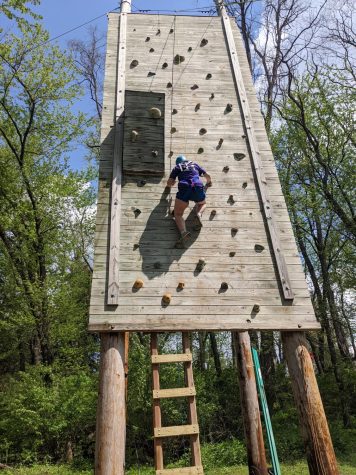The Homework Dispute
The topic of homework has always been debated whether it’s how much assigned or how difficult.
The topic of homework has always been debated whether it’s how much assigned or how difficult.
There is much contention over whether homework is more harmful or beneficial to students. While there are lots of studies on the subject, results can be conflicting and confusing. Many teachers are left to make their own decisions surrounding the subject. When it comes to what or how much homework to assign students, teachers in the Iowa City Community School District are left to decide for themselves.
“[ICCSD administration] loosely recommends the ten minute rule but that’s all,” said Nathan Oswald, science teacher.
The ten-minute rule recommends that students receive ten minutes of homework per day in first grade and ten more minutes each subsequent year so that by their senior year they have 120 minutes of homework per night. However, this rule breaks down to some extent once students enter middle school, as they have several teachers that are unaware of how much homework other teachers are assigning. This leaves the decision of how much homework to assign up to the individual teachers.
“Though all of my teachers assign homework, there is [a lot of variation] in the amount and type of homework I get from different teachers. Some teachers give 30 minutes worth of homework every night, while others give very little homework or give lots of class time to complete ‘homework’,” said an anonymous sophomore student.
Many teachers at Liberty have similar reasons for assigning homework.
“Some higher level concepts in science definitely require [homework] if you truly want to understand it and do well in classes,” said Oswald.
Debra Carlson, math, similarly said: “[Homework] helps students prepare for their assessments. That way they know what to expect when they are assessed. It tests whether students understood what the teacher just taught, if they meet the objectives and standards.”
Despite many high school teachers supporting and assigning their students homework, many report to be assigning much less homework than they received in high school for many different reasons.
“[Students] are at school for 7 to 8 hours a day, that [should be] enough. I just realized so many kids are so busy with jobs or sports, activities and I’m seeing that first hand now that I have two young children. Four out of my five nights a week I’m taking my kid to [activites]. When I get home I don’t want to do any work, grading, making lessons, etc. But a lot of the time my students are at home doing [homework I assigned them that night… That realization that there are bigger things, that my class is one of seven classes. If all teachers thought our class was the most important class, students would have a lot of homework every night. My class is not the biggest part of my students day,” explained Carlson.
However, an influx in teachers lessening the amount of homework they assign has left some parents and guardians unsatisfied with students’ workload.
“[My child who is in high school] has ¼ the amount of homework I had [in high school]. I believe the amount of school work I had provided me with a satisfactory education. I am concerned that with such little homework [students] are not receiving the same level of education… Problems in the education system usually lead to nationwide issues as students grow up and enter jobs and politics,” said Jens Strand, Liberty parent.
Unlike some parents, many students greatly appreciate when teachers give less homework, allowing for more activities outside of school.
“I think teachers are starting to consider more that students have lives outside of school. We have extracurriculars and sometimes we just want to relax. We spend seven hours a day at school, five days a week, for most of the year. I feel like that should be enough time for an adequate education. School shouldn’t take up [students] entire lives,” an anonymous student said.
There is variance in opinions on homework from individuals but what does research tell us? There seems to be a general consensus that while homework can be beneficial, too much of it can actually be more harmful than helpful.
An article published in Duke Today, titled “Duke Study: Homework Helps Students Succeed In School, As Long As There Isn’t Too Much” reads, “While it’s clear that homework is a critical part of the learning process… the analysis also showed that too much homework can be counter-productive for students at all levels.”
An article published in Stanford News says, “The research calls into question the value of assigning large amounts of homework… Homework should not be simply assigned as a routine practice… Rather, any homework assigned should have a purpose and benefit, and it should be designed to cultivate learning and development.”
However, education (and in turn, homework) is not one size fits all.
“Every student is different and every student’s circumstances are different. Different students will do better with different amounts and types of homework. [Wide reaching standards] for homework will never be perfect but it’s important to have discussions like these so we as a community, as a country, can improve as we can,” said anonymous.
While homework has always been a part of school, the concept has evolved over time. The homework debate has always existed. There has never been an exact standard of the amount of homework to be assigned. The decision of what and how much homework students receive has always been up to teachers. This begs the question will the debate over homework ever end or just carry on for future generations.

Leela is a senior at Liberty High School. This is her second year on the Live Wire staff. At Liberty, Leela plays tennis and is part of SEA club. Outside...

Chloe is a senior at Liberty and this is her second year on staff. At Liberty, Chloe is involved in cheerleading and tennis. Outside of school, she enjoys...













